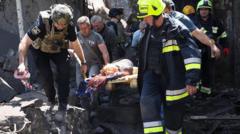President Trump has expressed dissatisfaction with both nations for breaching the cease-fire, heightening concerns over the volatile situation that has led to significant casualties on both sides.
**Cease-Fire Under Fire: Tensions Persist Between Israel and Iran Amid Fragile Truce**

**Cease-Fire Under Fire: Tensions Persist Between Israel and Iran Amid Fragile Truce**
A cease-fire intended to quell escalating violence in the Middle East shows signs of fragility as accusations fly between Israel and Iran.
President Trump addressed the escalating tensions between Israel and Iran on Tuesday, voicing his frustration over both nations' actions following the announcement of a cease-fire agreement. Attacks continued soon after the truce was declared, threatening its sustainability. The president criticized Israel for retaliating against Iran's missile strikes within hours, suggesting a lack of control among both countries during this crucial moment.
In the early dawn hours, Iran launched missile strikes against Israel, hitting residential areas and leading to casualties, including four deaths in Beersheba. In response, the Israeli military reported limited retaliatory strikes, including attacks on Iranian radar facilities. Despite the violent provocation, both sides have publicly denied violating the terms of the cease-fire, indicating their interest in maintaining the truce amid severe confrontations.
The cease-fire, brokered in part by Qatari officials acting as intermediaries, was announced in the midst of escalating hostilities. While world leaders welcomed President Trump's mediation efforts, they cautioned that the situation remained volatile. Russia expressed hope that the truce would be upheld, while France emphasized the need for continued diplomatic engagement in a turbulent environment.
Market reactions reflected concerns over the conflict, with Asian stocks rising and oil prices falling as investors reacted to the cease-fire news—albeit uncertain about its longevity. President Trump’s remarks regarding military strategies were closely scrutinized, signifying a broader geopolitical implication in the region as both nations navigate this precarious situation.
This tumultuous backdrop continues as the global community eyes developments closely, mindful that the fragile peace may still buckle under the strain of mutual distrust and aggressive rhetoric. The conflict's lifelines remain tenuous, with casualties mounting and international responses evolving as both sides try to assert their narratives in the battle for regional supremacy.
In the early dawn hours, Iran launched missile strikes against Israel, hitting residential areas and leading to casualties, including four deaths in Beersheba. In response, the Israeli military reported limited retaliatory strikes, including attacks on Iranian radar facilities. Despite the violent provocation, both sides have publicly denied violating the terms of the cease-fire, indicating their interest in maintaining the truce amid severe confrontations.
The cease-fire, brokered in part by Qatari officials acting as intermediaries, was announced in the midst of escalating hostilities. While world leaders welcomed President Trump's mediation efforts, they cautioned that the situation remained volatile. Russia expressed hope that the truce would be upheld, while France emphasized the need for continued diplomatic engagement in a turbulent environment.
Market reactions reflected concerns over the conflict, with Asian stocks rising and oil prices falling as investors reacted to the cease-fire news—albeit uncertain about its longevity. President Trump’s remarks regarding military strategies were closely scrutinized, signifying a broader geopolitical implication in the region as both nations navigate this precarious situation.
This tumultuous backdrop continues as the global community eyes developments closely, mindful that the fragile peace may still buckle under the strain of mutual distrust and aggressive rhetoric. The conflict's lifelines remain tenuous, with casualties mounting and international responses evolving as both sides try to assert their narratives in the battle for regional supremacy.























